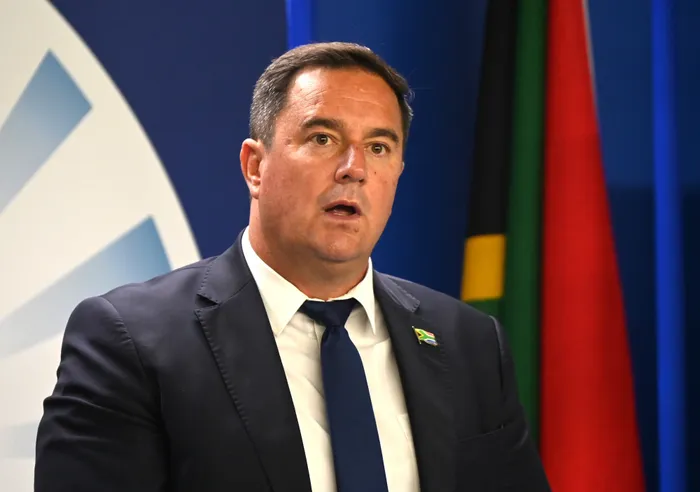John Steenhuisen endorses growing South African-Chinese agricultural trade relations

Minister of Agriculture and DA Federal leader John Steenhuisen champions pragmatic trade approach with China
Image: Ayanda Ndamane Independent Newspapers
In an address at the gala dinner following the G20 Agriculture Working Group and Food Security Task Force ministerial meetings, Democratic Alliance leader and Minister of Agriculture John Steenhuisen acknowledged the growing importance of South Africa’s trade relations with China for the sustainability and growth of the country’s agricultural sector.
Steenhuisen, alongside his deputy, Nokuzola Capa, hosted the event, which highlighted South Africa’s strategic role in global agricultural markets and its efforts to promote food security through international cooperation.
Despite longstanding political complexities - most notably his party’s historically critical stance on China’s “One China” policy and its support for Taiwan - Steenhuisen offered a pragmatic endorsement of China as a vital trade partner.
“Excellencies, this week has reminded us of a simple truth: agriculture cannot succeed in isolation. Farmers rely on markets, markets rely on trade, and trade relies on trust and cooperation between countries,” Steenhuisen told the gathering.
“South Africa has seen firsthand how these partnerships bear fruit. In the past year, we secured new protocols to export avocados to China, opening a fast-growing market to our farmers. Our horticultural products are also breaking new ground in Southeast Asia, with table grapes reaching the Philippines and Vietnam, and citrus gaining access to Vietnam.”
He continued, “These breakthroughs reflect confidence in our production systems and biosecurity standards. Our citrus industry, a backbone of our exports, continues to expand into new destinations thanks to collaborative work on phytosanitary measures and compliance.”
South Africa’s largest trade partner remains China, the primary destination for exports and a key source of imports. The US is the second largest, followed by Germany, India, and Mozambique.
The Minister’s statement comes amid escalating diplomatic tensions with the United States, where South Africa faces allegations of genocide against white minority communities, a claim the South African government strenuously denies.
This geopolitical friction has also translated into economic challenges, with the US's 30% tariffs weighing heavily on South African farmers and the automotive industry.
“These successes prove that cooperation is not an abstract idea; it translates directly into jobs, incomes, and opportunities on the ground,” Steenhuisen stated.
“However, partnerships are not only built through declarations. They are also built through relationships between people. The conversations we share tonight are as important as the meeting room negotiations because trust begins with friendship.”
Political analyst Henry Myataza said the country's economic realities fuel the policy shift.
“Steenhuisen’s strong acknowledgement of China’s pivotal role signals a potential shift toward greater economic pragmatism in South Africa’s external engagements- one that could redefine the boundaries between ideological positions and national economic imperatives.”
He added that as the global food security crisis intensifies, South Africa’s ability to leverage its trading relationships, particularly with China and East Asian markets, will be critical in bolstering the agricultural sector and the livelihoods it supports.
thabo.makwakwa@inl.co.za
IOL Politics
Get your news on the go. Download the latest IOL App for Android and IOS now
Related Topics: